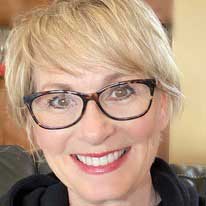Boulders
– Nonfiction by Julia Miller –

Ella is nineteen in the photo. Her style is playful. She wears a long, tie-dyed t-shirt, leggings, and red sneakers. Super short dark hair complements strong eyebrows, a pixie nose. Balancing on one leg atop a giant boulder, her right hand is locked with the left hand of another young woman. They look at the camera, their eyes alight with laughter.
For thirty-five years, I have kept a photo of Ella’s mother Avery at the same age, the year we met. Avery sat on a boulder, surrounded by the red Sedona hills. Laughing, she had tossed off her t-shirt and I snapped a photo that did not get shared. It ended up tucked in a small cardboard envelope inside a box with other pieces of our mutual history.Now, I find it alongside other snapshots of our four years together. I shuffle through the box which is mostly photos of each of us with rescued cats. There’s Avery with Chicken, who had the dramatic markings of a Bantam; and with Cheba, fully grown but so tiny, found with a pebble where one eye should have been. There are three Christmases: trees, gingerbread houses, stockings. In one photo we lean against each other in a restaurant, laughing. College students, we had saved and pooled our money for a brunch out, made the bus trek to Goodwill to find dresses. And there’s Avery folded up on the kitchen counter in thick pink socks and green plaid pajamas, eyes laughing. Ella has her eyes.
I look at this last picture a bit longer, remembering her father’s fury that she loved me, his look of disgust as he spat the words, “You’ll be the death of your mother!” Later that year, when Avery’s mother died during open heart surgery, she was handed a boulder of grief and shame that I’m sure she carries even now. She died of a broken heart her family told her. We broke her mother’s heart.
I pick up a picture Avery sent from California when Ella was born. She holds her baby girl up to her face. Her smile is exquisite. Before I can shield myself, I am hit with a pang of loss.The letter that accompanied that picture peeks out from the box in its pale, yellow envelope. As I lift it, its contents slip onto the floor, spilling more photos. These snapshots show Ella at age two or so, along with a baby boy—Kai, Avery tells me in the letter. She says she is happy, teaches fifth grade. She says she has corresponded with my sister Kate occasionally over the years. Kate gave Avery my phone number, but Avery says she felt it would be better if she sent a letter to my address, which Kate has also given her. Wow, I thought then and think again now, Thanks for the heads up.
Facebook is at fault for the boulder that now balances precariously on the precipice above me, threatening to fall. I saw Avery’s friend request and paused before accepting it. Now I click the private message she has sent with a mixture of excitement and dread.
She’s so happy she’s found me! She’d love to catch up, hear what I’ve been doing over the years. I ask about her work, her children, avoid talking about my life.
She tells me Ella has just finished an alternative high school program. Anxiety put traditional school out of reach. I tell her about my son who has battled bipolar disorder and has also finished school through an alternative program.
I flash back to the first time I saw Avery. We were in the women’s restroom in Landrum Hall between classes. She was nineteen, I was twenty-two. She was so small, dark skin, dark hair slipping across her shoulders as she bent her head, washing her hands. Suddenly, Avery looked up and caught me watching her. I stood transfixed by the unexpected pale gray eyes.
In a quick mental slide show, the next image is the day she left.
“We’re young,”Avery had insisted, “We’re meant to explore life and you’re always exhausted from nothing. Nothing.”
“Remember last month?” I grasped for energetic memories. “We went to the beach, and I picked up a pebble. I said, Imagine. This was a boulder once. You said I should write a poem.”
“But you didn’t,” Avery said simply, her eyebrows pinched together, her voice flat.
“But I can. I will,” I insisted. Not only did she not believe me I could tell she didn’t care. Poem or no poem, Avery was leaving.
As I tried desperately to stop her departure, I slipped deeper beneath the dank, heavy earth of depression, my hands pounding on the dirt coffin pressing me down. I screamed, dreamlike wails choking my words into silence. Meanwhile Avery hurried, collected items for her immediate needs, tried hard to contain the excitement of meeting up with her new love.
But now, sharing stories about our children, the swell rises, and I find it is impossible not to trust her, even after such a painful ending. I tell her. Avery replies with a smiley face emoji. Splat. I knew that damned boulder would fall.I make up an excuse to end the conversation.
Later, when I am braver and overwhelmed with curiosity, I pour over Avery’s Facebook photos. She looks very different. She looks just the same. I click through the digital shots that don’t bear the weight of a picture held in the hand. That’s when I see Ella on the boulder, the same age as her mother when we met, trusting the other young woman to keep her balanced.
Don’t fall, Ella, I think, Find your balance. Let her help if it pleases you but find your balance.
Ella’s eyes look at the camera, bright, as if she hears me.
About the Author – Julia Miller

Julia Anne Miller has taught undergraduate philosophy at Stony Brook University and the University of Cincinnati and leads a writing workshop at Miami University’s Institute for Learning in Retirement. She has an M.A. in Philosophy from Stony Brook and a Ph.D. in Interdisciplinary Studies with a concentration in Humanities and Culture from Union Institute & University. Her research focuses on embodied experiences of traumatic brain injury and creative expressions of bipolar disorder. Dr. Miller has published poetry and creative nonfiction in a variety of journals and anthologies, including Kaleidoscope: Exploring Literature & the Fine Arts Through Disability, the Dreamers Creative Writing Digest Year 1 anthology, and two Jack Walker Press anthologies in their Voices series.
Did you like this story by Julia Miller? To see more like it, checkout our Nonfiction category.
Like reading print publications? Consider subscribing to the Dreamers Magazine!

2024 Micro Nonfiction Story Writing Contest Results
Congratulations to the winners of the 2024 Dreamers Micro Nonfiction Story Writing Contest, for nonfiction stories between 100-300 words.

2024 Place and Home Contest Results
Congratulations to the winners of the Dreamers 2024 Place and Home Contest, based on the theme of migration, place & home.